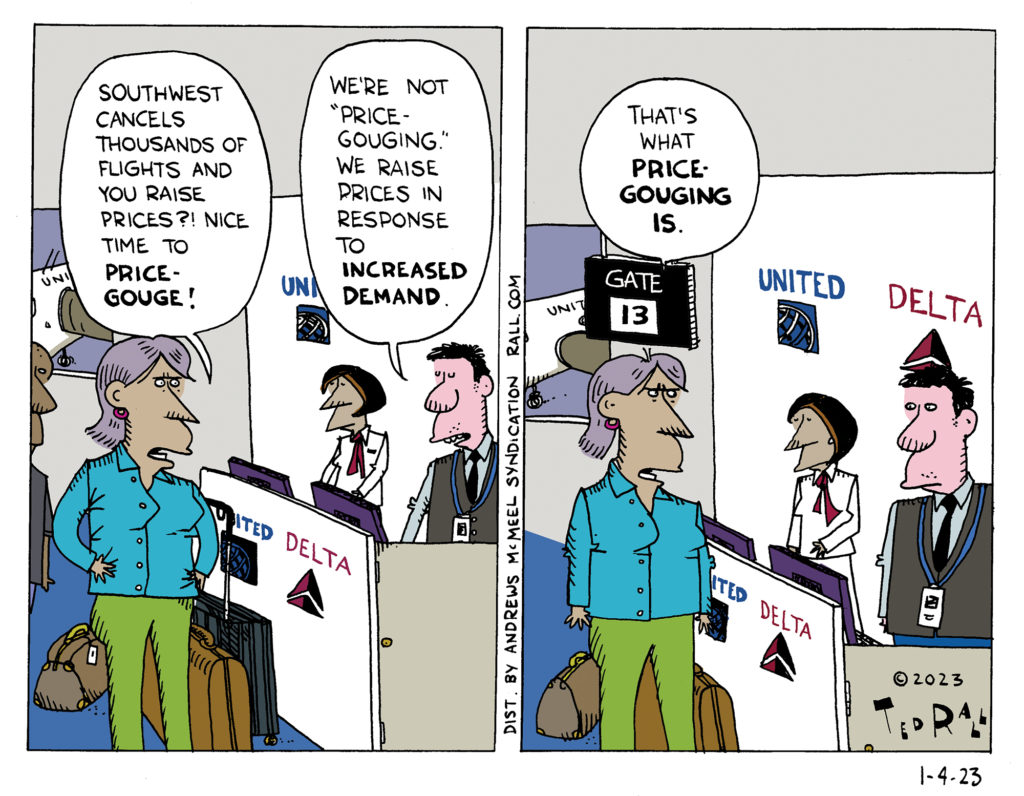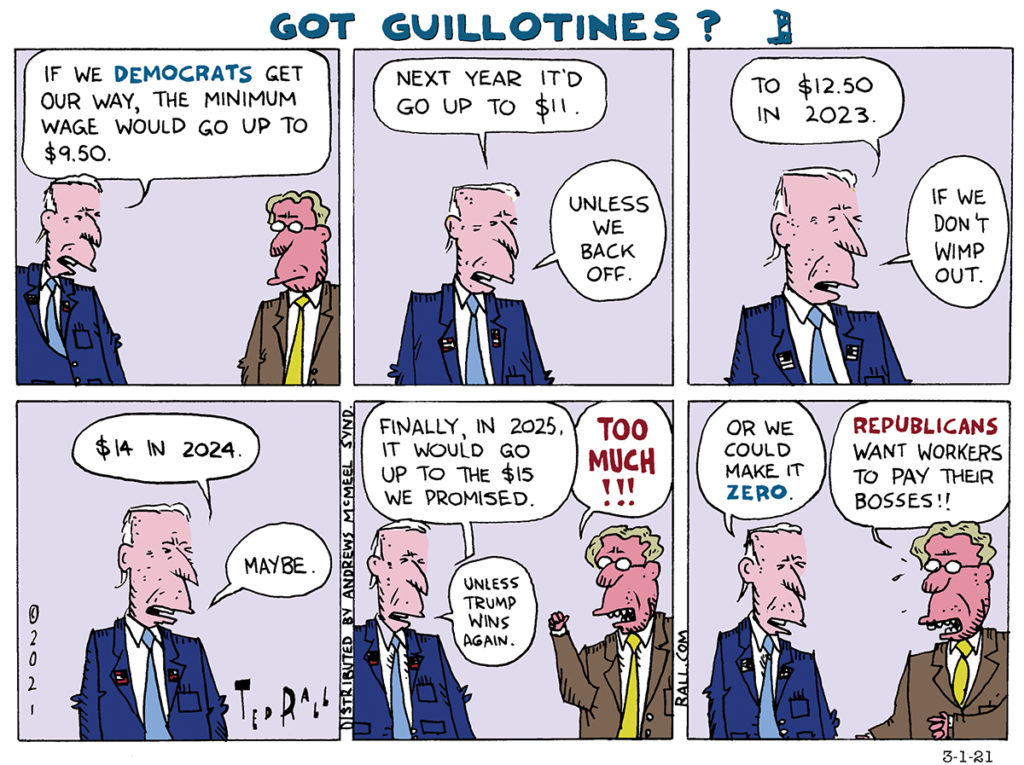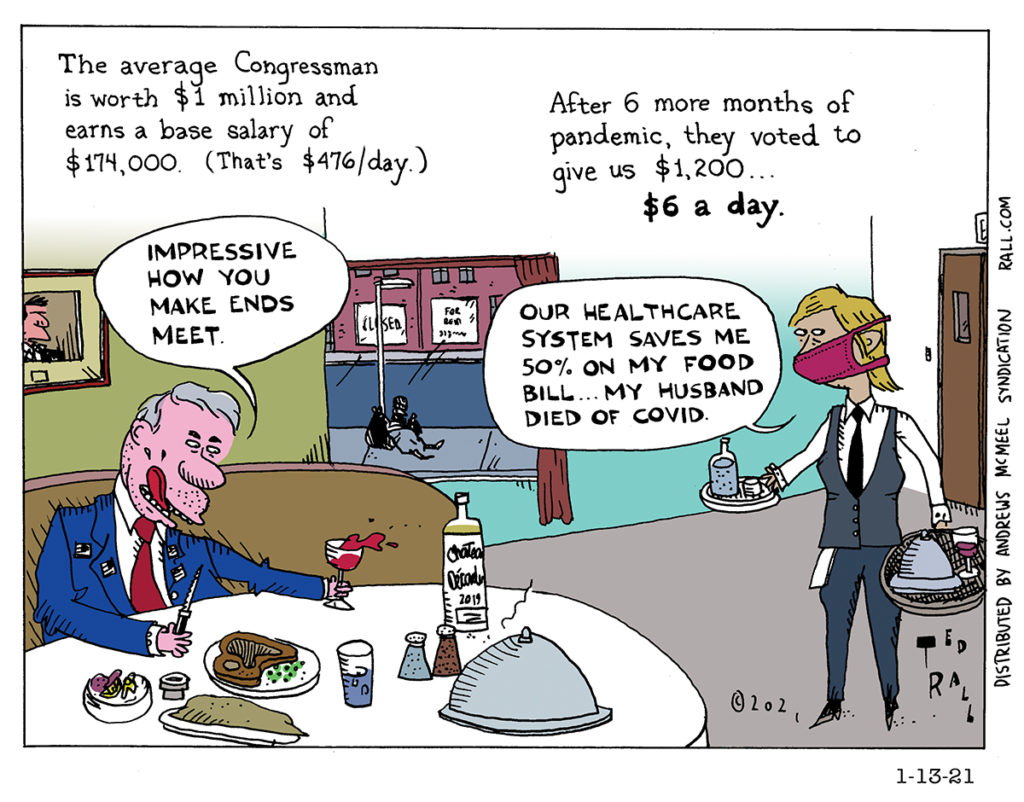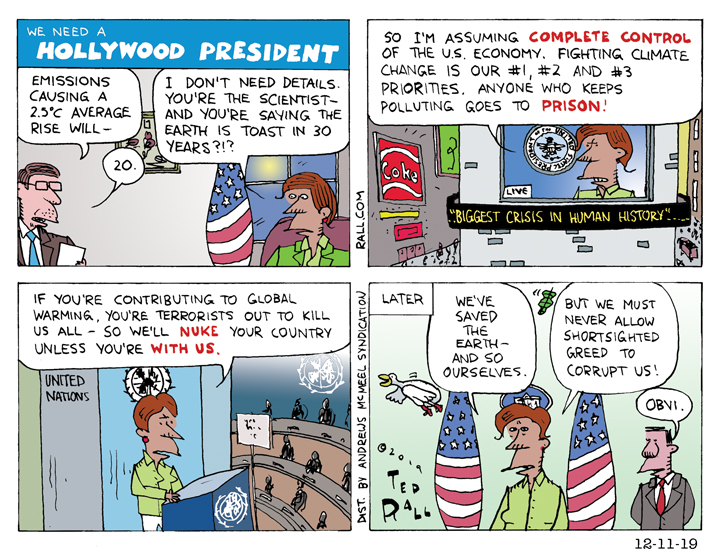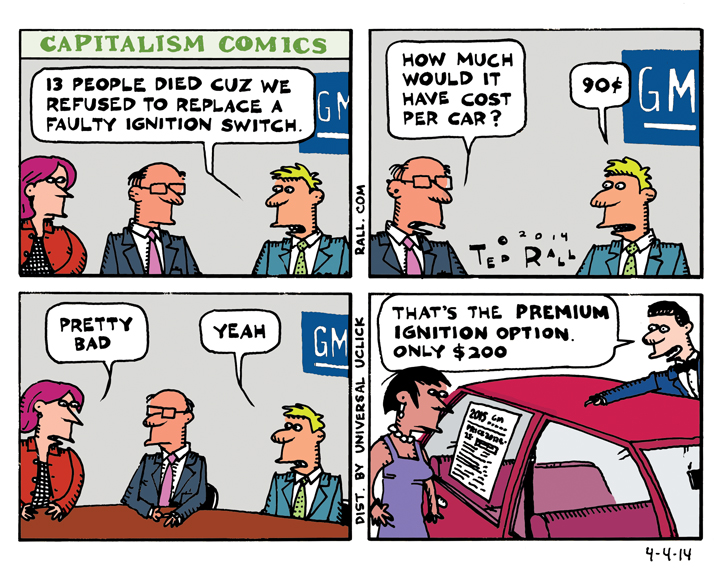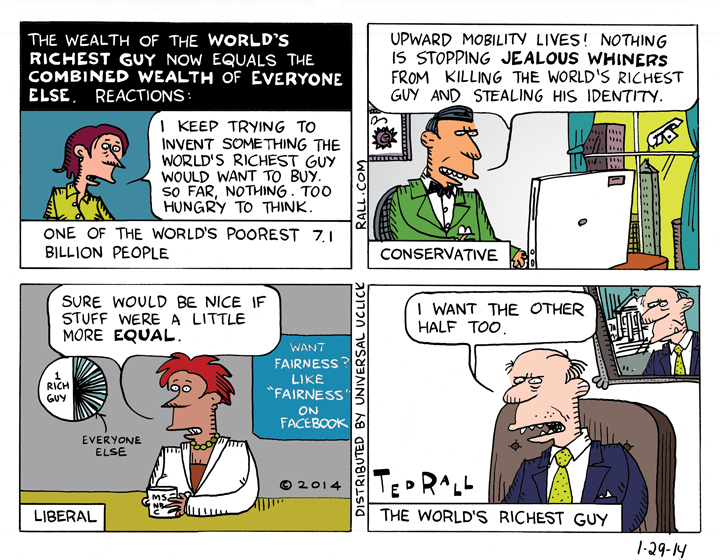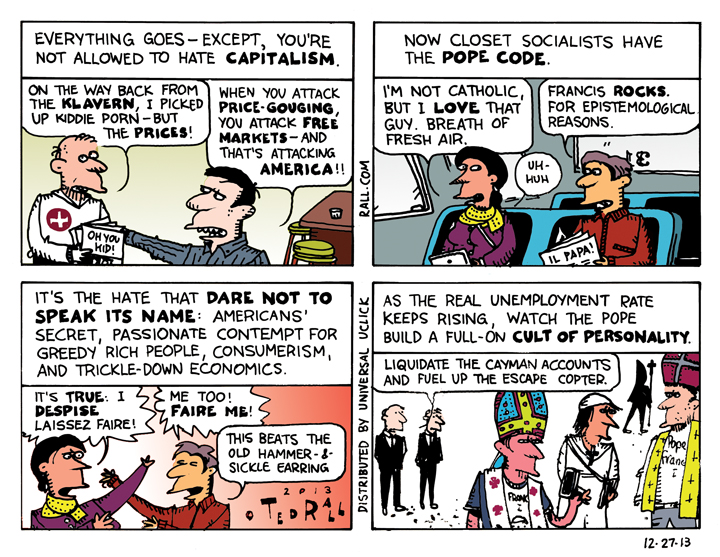A winter storm, labor, shortages, and outdated computer systems caused Southwest Airlines to cancel thousands of flights over the winter holidays. Travelers reported that other airlines, instead of helping out, raised their prices to take advantage of the situation.
Got Guillotines?
Assuming the Democrats get their way, and that’s highly unlikely, their proposal for the minimum wage isn’t really for $15 an hour. It’s for $15 an hour eventually, four years or five years from now. And the Democrats seem to be about to give that up as it is. When it comes to not doing anything for the working class, there’s lots of bipartisanship.
SYNDICATED COLUMN: Who’s Really To Blame for Brexit (and Trump)
 At this writing, securities markets and the international community are reeling at the news that British voters have opted to leave the European Union. The “Brexit” has provoked angry reactions from the pro-Remain camp, who accuse Leave voters of stupidity, shortsighted ignorance and, worse, thinly-disguised racism and nativism posing as nationalism.
At this writing, securities markets and the international community are reeling at the news that British voters have opted to leave the European Union. The “Brexit” has provoked angry reactions from the pro-Remain camp, who accuse Leave voters of stupidity, shortsighted ignorance and, worse, thinly-disguised racism and nativism posing as nationalism.
Political analysts point out that British voters were divided geographically – Scotland wanted to stay, England wanted to leave – as well as demographically. One chart that managed to go semi-viral online displayed high support for the Brexit among older voters, opposition among the young, alongside the actuarial average years remaining that each age group would have to live with the consequences of the vote. The smartest of these pundits focus on the class divide between shiny expensive youth-oriented cities like London, where pro-European sentiments are strong, and England’s version of the Rust Belt, abandoned hellholes where citizens barely subsist in a ruined landscape of shut down factories and widespread unemployment.
“If you’ve got money, you vote in,” a voter in Manchester told The Guardian. “If you haven’t got money, you vote out,” she said.
Amid all the concern about a collapsing British pound and the possible dissolution of not only the European Union – looks like France and the Netherlands may have a similar plebiscite in the near future – but also the United Kingdom, everyone’s out to cast blame. However, no one is pointing at those who are most responsible if (and it’s far from certain) Brexit leads to an economic downturn and/or a political debacle: the West’s incompetent political class, and its idiotic enablers in the corporate media.
The postwar order began to fray during the 1970s, when business leaders and their allies in government started to push aggressively for policies that encouraged the transfer of manufacturing industries to the developing world away from what was then called the First World in preparation for what we now call the information economy. Globalization is the shorthand term for deindustrialization – some call it outsourcing, others prefer the simpler “shipping jobs overseas” – and digitalization of culture and intellectual property.
This essay isn’t about whether globalization is good or bad. It’s about the way a trend that has been consistently declared irreversible has been poorly managed. That mismanagement led to the Brexit, and may elect Donald Trump.
Even during the 1970s, globalization’s downward pressure on wages was easy to foresee. Capital was becoming increasingly fluid, crossing borders with incredible ease in search of places and people where the production of goods and services could be done as cheaply as possible. If you own a factory in Michigan, and you can figure out a way to transport your product to market at reasonable cost, doing the patriotic “made in USA” thing feels like leaving money on the table when you consider what your expenses would look like in Vietnam or Indonesia.
Workers, on the other hand, are confined by international borders, linguistic and cultural limitations, family ties, and just plain inertia, to the nations — and often the regions within those countries — where they were born. If the highest wages in the world are paid in the United Arab Emirates, you can’t just hop on a plane and expect to find a job, much less a work permit. Workers are stuck; capital moves freely. This economic imbalance between labor and management is a significant contributing factor to the decline in real median wages in countries like Great Britain and the United States since the 1970s.
Now let’s say that you’re a high-ranking member of the ruling class: a Fortune 500 CEO, a head of state, a congressman, the publisher of a big-city newspaper. You don’t need a major in history or political science in order to anticipate that subjecting tens of millions of people to long-term unemployment and underemployment is a recipe for social dysfunction and the kind of class resentment that can be exploited by a demagogue or radical populist movement.
You can do one of two things with that knowledge. You can ignore victims of economic dislocation. Or you can help them.
If you ignore them, if you greedily grab up every dollar and pound and euro you can while city after city slowly collapses into alcoholism, drug abuse and rising crime, you know you’re setting yourself up for a future of political instability. It may take a long time, but the chickens will come home to roost. When things turn ugly, it could cost you a pile of cash you amassed during your orgy of greed.
That’s what happened during the 1980s, when Margaret Thatcher and Ronald Reagan dismantled the post-World War II social safety nets. Precisely at a time when the UK and the US needed more welfare, national healthcare and public education programs, they slashed them instead. Those austerity policies continued under Tony Blair, Bill Clinton, David Cameron, and – against reason and common sense – under Barack Obama after the 2008 economic meltdown.
The British and American political classes made a conscious decision over the last 40 to 50 years not to lift a finger to help those who lost their jobs to deindustrialization and globalization. Go back to college, they say. Get retrained. But most Americans can’t afford college tuition — the jobless least of all! We need(ed) a GI Bill for the dispossessed.
Even this week, many establishment types continue to criticize aging pensioners and unemployed workers over age 50, denigrating them as selfish, clueless, unwilling and unable to adapt themselves to the new – brutal – world in which we find ourselves.
No doubt: nativism and racism played a role in the Brexit vote. England is an island nation with an island mentality. Though only a few thousand Syrians entered the UK last year, with nary a passport check, images of refugees riding the roof of trains from France through the Chunnel felt like an invasion to some Britons. But bigotry shouldn’t let us ignore the economic factor. When jobs are plentiful and salaries are rising, no one minds immigration. Xenophobia grows in the soil of scarcity.
What did the elites think? Did they really believe it was possible to make so many people so desperate and so angry for so long without a risk of them lashing out?
Donald Trump is not a brilliant man. But the political classes could learn a lesson from him. He knows that an awful lot of people are angry. And he knows why.
(Ted Rall is the author of “Bernie,” a biography written with the cooperation of Democratic presidential candidate Bernie Sanders. His next book, the graphic biography “Trump,” comes out July 19th and is now available for pre-order.)
SYNDICATED COLUMN: Healthcare Insurance Pigs Soaking Americans With Secret 20%-40% Rate Increases on Obamacare

This is what happens when you trust free markets.
You probably heard that the Supreme Court rejected the latest legal challenge to the Affordable Care Act, a.k.a. Obamacare, a.k.a. The Great Transfer of Taxpayer Dollars to Scumbag Health Insurance Companies. That news broke during a major news day.
What you likely missed, because it came out on July 3rd when everyone was driving to the beach or flying somewhere fun for their Independence Day weekend getaways instead of paying attention to the news, was that the ACA is tanking. That’s why you have me: to read depressing tidbits about America’s decline, and to annoy Obamabots with another I-told-you-so.
When Obama resurrected 1993’s benighted Hillarycare scheme, I warned that there were two major problems with this convoluted hybrid of government-managed healthcare and for-profit healthcare.
First, the Affordable Care Act kept the insurance companies in business. Aetna, United Healthcare and the other big insurers are a huge drain on the system, sucking out billions in profits and driving up costs. Profitmaking has no place in healthcare, which is a basic human right, like air and water. Air and water are free; healthcare should be free too. But that’s the opposite of what drives health insurers: they want to give you as little care as possible while charging you as much as possible.
Second, the ACA diminished Americans’ zeal for socialized medicine, the standard in the developed world. “In legislation no bread is often better than half a loaf,” Robert La Follette, the Wisconsin Progressive of the late 19th and early 20th centuries, pointed out. “Half a loaf, as a rule, dulls the appetite, and destroys the keenness of interest in attaining the full loaf.” I wrote last year: “In 2007, before Obama and his ACA came along, 54% of Americans favored single-payer. Now, thanks to a system that’s better than nothing but not nearly good enough, it’s down to 37%. Hillary Clinton is endorsing Obamacare, and has officially come out against single-payer.”
Now that the public has had a chance to use and pay for Obamacare, support for single-payer is back up to 50%.
Back to that story that broke on the deadest news day of the year. From The New York Times: “Health insurance companies around the country are seeking rate increases of 20% to 40% or more, saying their new customers under the Affordable Care Act turned out to be sicker than expected…Blue Cross and Blue Shield plans — market leaders in many states — are seeking rate increases that average 23 percent in Illinois, 25 percent in North Carolina, 31 percent in Oklahoma, 36 percent in Tennessee and 54 percent in Minnesota, according to documents posted online by the federal government and state insurance commissioners and interviews with insurance executives.”
Did your paycheck go up 20%, much less 40%, in the last year? I didn’t think so.
The proper reaction to this disgusting move — remember, we’re talking about a for-profit corporate sector that rakes in billions of dollars a month and pays its CEOs millions of dollars a year — is to line up the executives responsible against a wall and shoot them full of holes, then deny the healthcare claims of any who survive just because, as the rest of us routinely experience.
Since that would be illegal, however, the second-best approach should be to shame the bastards relentlessly on social media, until they’re forced to go join ISIS because people would subject them to Two Minute Hates wherever they go. (Not to say that ISIS, which provides free healthcare, would want these human turds either.)
This is where one naturally turns to political leadership. Surely the President of the United States, a.k.a. He For Whom Obamacare Is Named, will crack down on these insurance pirates?
Not so much. Obama “said that consumers should put pressure on state insurance regulators to scrutinize the proposed rate increases. If commissioners do their job and actively review rates, he said, ‘my expectation is that they’ll come in significantly lower than what’s being requested.'”
No doubt the healthcare industry itself, which rakes in billions each year from their new involuntary customers, hears our anger.
Not so much. Marinan Williams, CEO of the Scott & White Health Plan in Texas, which applied for a 32% rate hike, says: “Over the next three years, I hope, rates will start to stabilize.” How about we “stabilize” her salary at 32% less than she gets now?
How’s your interest in the “full loaf” — single-payer socialized medicine — now?
(Ted Rall, syndicated writer and the cartoonist for The Los Angeles Times, is the author of the book “Snowden,” the first biography of NSA whistleblower Edward J. Snowden. It is in graphic novel form, and will publish August 18th. You can subscribe to Ted Rall at Beacon.)
COPYRIGHT 2015 TED RALL, DISTRIBUTED BY CREATORS.COM
The Pope Code
65% of Americans say they agree with Pope Francis I’s critique of capitalism. But because we’re not allowed to publicly voice our opposition to capitalism, we resort to a sort of “dog whistle” — a “pope code” — in which we express our approval of the pope as an acceptable way to transmit our closet sympathies for socialism and communism.

